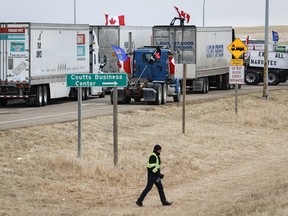The Canadian Meat Council said there were more than 150 loads of beef stuck at the border crossing on Monday

Article content
As more than 100 truckers blockade the Coutts border crossing in Alberta for a third day, resulting in its closure by the Canadian Border Services Agency, industry has begun to speak out.
Advertisement
This advertisement has not loaded yet, but your article continues below.
Article content
“The reliability of a stable supply chain is essential to Canadian beef production,” said Bob Lowe, president of the Canadian Cattlemen’s Association, in an email on Monday. “Early in the pandemic, food production and the food supply chain were labelled essential services and critical infrastructure in Canada. Transportation delays can severely impact the beef supply chain on everything from animal feed through to the transport of cattle.”
This followed a post to Twitter from the Canadian Meat Council (CMC) in the afternoon that said there were more than 150 loads of Canadian beef stuck at the crossing.
“Our members are going to have to slow down production if this keeps up,” said the tweet. “What is the government’s approach to fix this?”
Advertisement
This advertisement has not loaded yet, but your article continues below.
Article content

Coutts is Alberta’s only 24-hour crossing into the the U.S. and Marie-France MacKinnon, the vice president of public affairs for the CMC, warned in an email: “The longer this takes, it will cause more supply chain issues and this will affect everyone from producer to consumer.”
The blockade began on Saturday in support of the Freedom Convoy in which truckers from across Canada descended on Ottawa in an effort to pressure the federal government into ending all COVID-related mandates. It started as an effort to end vaccine mandates for truckers that went into effect on Jan. 15, but has grown from there. The U.S. implemented their own mandate a week later.
“The truckers do have the right to peaceful protest, that’s every Canadian’s right,” said Ken Kobly, president of the Alberta Chamber of Commerce. “However, things such as the blockade at Coutts … that goes to preventing other truckers from delivering their loads across to the United States. When you talk about impact on supply chain, that goes right to that issue.”
Advertisement
This advertisement has not loaded yet, but your article continues below.
Article content

John Graham, the director of public relations for the Retail Council of Canada’s Prairie division, called these disruptions “short term, relatively minor and adding unnecessary delays to truck drivers continuing to deliver the products Albertans use and rely on every day.”
He noted member grocery stores have a 90 to 94 per cent fill rate and that the fill rate is never 100 per cent due to a wide range of issues.
“In almost all cases we’re seeing a delay of goods, and not a shortage, and wish to make it clear that grocers have plenty of goods to provide their customers,” said Graham.
The biggest issue in supply chain disruption, right now, is workforce, with labour shortages in many sectors.

The Canadian Trucking Alliance (CTA) estimated a week ago that the industry has a vaccination rate of between 85 and 90 per cent. However, there is also a truck driving shortage of 20,000 to 25,000 drivers that was already in place prior to the mandates.
Advertisement
This advertisement has not loaded yet, but your article continues below.
Article content
Meanwhile, the CMC said on Monday they are calling on the federal government to raise the temporary foreign worker cap to 30 per cent.
“The Government declared us essential sector but we have not seen any measures implemented to help address our essential workforce,” said MacKinnon.
-
Protesters ignore RCMP warnings as blockade at Coutts border crossing stretches into third day
-

Trucker convoy: Canadians ‘shocked and disgusted’ by some protesters’ behaviour, Trudeau says
-

Ottawa still gridlocked by protesters while residents say it’s time for them to go
The CTA, which has backed the federal mandates and has called out those participating in the convoy was seeking solutions to the shortage at the National Supply Chain Summit hosted by Transportation Minister Omar Alghabra. The CTA was seeking a marketing partnership with the federal government, improved access to training and programs through immigration.
“As the old saying goes, Canada moves by truck; but a more accurate description is Canada moves by truck drivers,” says Stephen Laskowski, president of the CTA, in a press release. “Consequently, labour shortages in trucking warrants priority action by the Government of Canada to secure the supply chain and improve Canada’s economic recovery.”
Twitter: @JoshAldrich03



